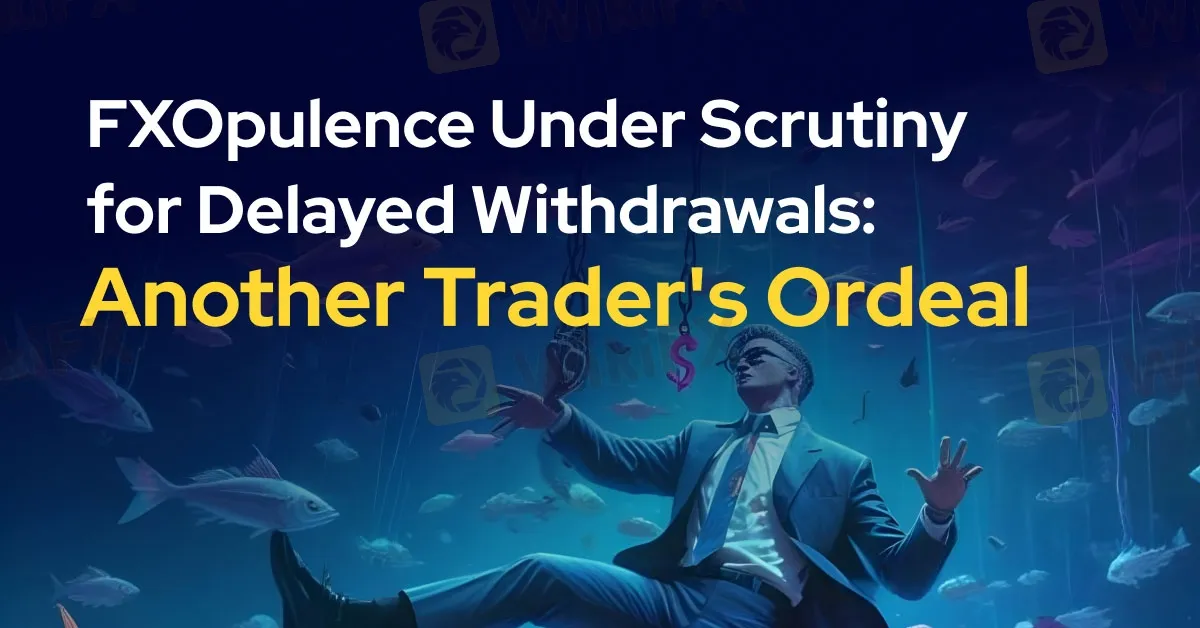简体中文
繁體中文
English
Pусский
日本語
ภาษาไทย
Tiếng Việt
Bahasa Indonesia
Español
हिन्दी
Filippiiniläinen
Français
Deutsch
Português
Türkçe
한국어
العربية
FXOpulence Under Scrutiny for Delayed Withdrawals: Another Trader's Ordeal
Abstract:Recent incidents involving the broker FXOpulence have raised significant concerns. Following the case of an Indian trader, another individual, Yogesh, has come forward with a similar troubling experience regarding withdrawal delays.

In the online trading sector, ensuring prompt and secure fund transfers is essential for maintaining investor confidence. Recent issues with the broker FXOpulence have come under the spotlight again, as another trader, Yogesh, has reported significant delays in withdrawing his funds, mirroring a previously reported case.
Yogesh, who invested 4500 USDT, has faced continuous hurdles in retrieving his money. Despite submitting multiple withdrawal requests totalling 4688.86 USDT, FXOpulence has not processed any of them. The broker attributed the delays to a cyber-attack, but this explanation has left Yogesh without access to his investment.

After contacting FXOpulence's customer service, Yogesh was informed that the cyber-attack had disrupted the processing of USDT withdrawals. Trusting this explanation, he waited for the issue to be resolved. However, as time went on and his funds remained inaccessible, his frustration grew.
In the fiercely competitive online trading market, adhering to industry standards and best practices is vital for maintaining a brokers reputation and client base. Key among these practices is the efficient and transparent processing of withdrawals. Any failure to meet this standard can lead to client dissatisfaction and a loss of trust, driving traders to seek alternative platforms.
Typically, reputable trading platforms ensure that withdrawals are handled within a specified timeframe, providing clear communication and proactive support to address any issues. FXOpulence's inability to meet these expectations in Yogesh's case has caused significant concern among its users.
This situation underscores the necessity for traders to thoroughly research trading platforms before committing their funds. Assessing a platform's efficiency and reliability, reading user reviews, checking regulatory compliance, and understanding withdrawal policies are crucial steps in making an informed decision.
For those evaluating brokers, thorough due diligence is crucial. WikiFX, a global forex regulatory query platform, provides verified information on over 50,000 brokers worldwide. Utilizing resources like WikiFX helps traders identify brokers with high ratings and valid licenses, offering better protection for their capital and a more secure trading experience.

Had Yogesh researched FXOpulence on WikiFX before investing, he would have discovered its poor rating. The broker's license had been revoked by Australia's ASIC, and it had numerous complaints from dissatisfied clients worldwide who felt wronged by FXOpulence's actions.


WikiFX emphasizes the importance of choosing regulated brokers with valid licenses and high WikiScores to protect capital and enhance trading experiences. Incidents like Yogesh's highlight the critical need for due diligence in the online trading industry, ensuring that traders make informed and secure choices.

Disclaimer:
The views in this article only represent the author's personal views, and do not constitute investment advice on this platform. This platform does not guarantee the accuracy, completeness and timeliness of the information in the article, and will not be liable for any loss caused by the use of or reliance on the information in the article.
Read more

The Hidden Checklist: Five Unconventional Steps to Vet Your Broker
Forex broker scams continue to evolve, employing new tactics to appear credible and mislead unsuspecting traders. Identifying these fraudulent schemes requires vigilance and strategies beyond the usual advice. Here are five effective methods to help traders assess the legitimacy of a forex broker and avoid potential pitfalls.

Doo Financial Obtains Licenses in BVI and Cayman Islands
Doo Financial, a subsidiary of Singapore-based Doo Group, has expanded its regulatory footprint by securing new offshore licenses from the British Virgin Islands Financial Services Commission (BVI FSC) and the Cayman Islands Monetary Authority (CIMA).

CFI’s New Initiative Aims to Promote Transparency in Trading
A new programme has been launched by CFI to address the growing need for transparency and awareness in online trading. Named “Trading Transparency+: Empowering Awareness and Clarity in Trading,” the initiative seeks to combat misinformation and equip individuals with resources to evaluate whether trading aligns with their financial goals and circumstances.

Malaysian-Thai Fraud Syndicate Dismantled, Millions in Losses Reported
The Royal Malaysia Police (PDRM) has received 26 reports concerning the Nicshare and CommonApps investment schemes, both linked to a major fraudulent syndicate led by a Malaysian citizen. The syndicate’s activities came to light following the arrest of its leader by Thai authorities on 16 December.
WikiFX Broker
Latest News
Top 10 Trading Indicators Every Forex Trader Should Know
ASIC Sues Binance Australia Derivatives for Misclassifying Retail Clients
WikiFX Review: Is FxPro Reliable?
Malaysian-Thai Fraud Syndicate Dismantled, Millions in Losses Reported
Trading frauds topped the list of scams in India- Report Reveals
YAMARKETS' Jingle Bells Christmas Offer!
AIMS Broker Review
The Hidden Checklist: Five Unconventional Steps to Vet Your Broker
Revolut Leads UK Neobanks in the Digital Banking Revolution
Fusion Markets: Safe Choice or Scam to Avoid?
Currency Calculator


